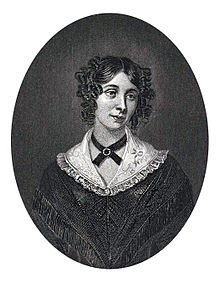Great Throughts Treasury
This site is dedicated to the memory of Dr. Alan William Smolowe who gave birth to the creation of this database.

Sarah Ellis, fully Sarah Stickney Ellis
American Quaker turned Congregationalist, Author
"To act the part of a true friend requires more conscientious feeling than to fill with credit and complacency any other station or capacity in social life."
"Never do a wrong thing to make a friend or to keep one."
"Above all other characteristics of the women of England, the strong moral feeling pervading even their most trifling and familiar actions, ought to be mentioned as most conducive to the maintenance of that high place which they so justly claim in the society of their native land. The women of England are not surpassed by those of any other country for their clear perception of the right and the wrong of common and familiar things, for their reference to principle in the ordinary affairs of life, and for their united maintenance of that social order, sound integrity, and domestic peace, which constitute the foundation of all that is most valuable in the society of our native land. Much as I have said of the influence of the domestic habits of my country-women, it is, after all, to the prevalence of religious instruction, and the operation of religious principle upon the heart, that the consistent maintenance of their high tone of moral character is to be attributed. Women are said to be more easily brought under this influence than men; and we consequently see, in places of public worship, and on all occasions in which a religious object is the motive for exertion, a greater proportion of women than of men."
"Believe in who you are first and you will succeed."
"If all was confusion and neglect at home--filial appeals unanswered--domestic comforts uncalculated--husbands, sons, and brothers referred to servants for all the little offices of social kindness, in order that the ladies of the family might hurry away at the appointed time to some committee-room, scientific lecture, or public assembly: however laudable the object for which they met, there would be sufficient cause why their cheeks should be mantled with the blush of burning shame which those whose charity has not begun at home, ought never to appropriate to themselves."
"It is not to be presumed that women possess more moral power than men; but happily for them, such are their early impressions, associations, and general position in the world, that their moral feelings are less liable to be impaired by the pecuniary objects which too often constitute the chief end of man, and which, even under the limitations of better principle, necessarily engage a large portion of his thoughts."
"What shall I do to gratify myself--to be admired--or to vary the tenor of my existence? are not the questions which a woman of right feelings asks on first awaking to the avocations of the day. Much more congenial to the highest attributes of woman's character, are inquiries such as these: "How shall I endeavor through this day to turn the time, the health, and the means permitted me to enjoy, to the best account? Is anyone sick, I must visit their chamber without delay, and try to give their apartment an air of comfort, by arranging such things as the wearied nurse may not have thought of. Is any one about to set off on a journey, I must see that the early meal is spread, to prepare it with my own hands, in order that the servant, who was working late last night, may profit by unbroken rest. Did I fail in what was kind or considerate to any of the family yesterday; I will meet her this morning with a cordial welcome, and show, in the most delicate way I can, that I am anxious to atone for the past. Was any one exhausted by the last day's exertion, I will be an hour before them this morning, and let them see that their labor is so much in advance. Or, if nothing extraordinary occurs to claim my attention, I will meet the family with a consciousness that, being the least engaged of any member of it, I am consequently the most at liberty to devote myself to the general good of the whole, by cultivating cheerful conversation, adapting myself to the prevailing tone of feeling, and leading those who are least happy, to think and speak of what will make them more so.""
"The women of England, possessing the grand privilege of being better instructed than those of any other country, in the minutiae of domestic comfort, have obtained a degree of importance in society far beyond what their unobtrusive virtues would appear to claim."
"It is a widely mistaken notion to suppose that the sphere of usefulness recommended here, is a humiliating and degraded one. With [some women] it is a favorite plea, brought forward in extenuation of their own uselessness, that they have no influence--that they are not leading women--that society takes no note of them."